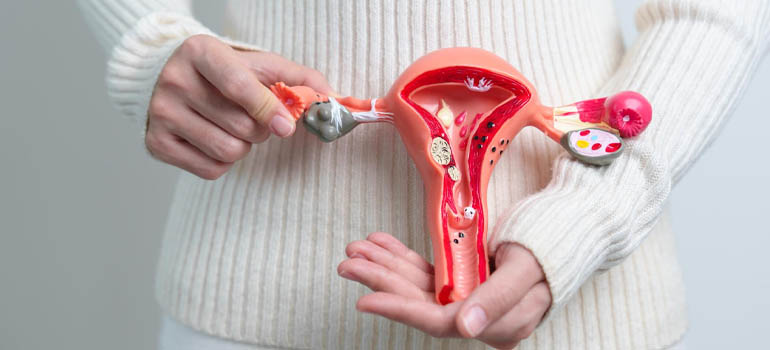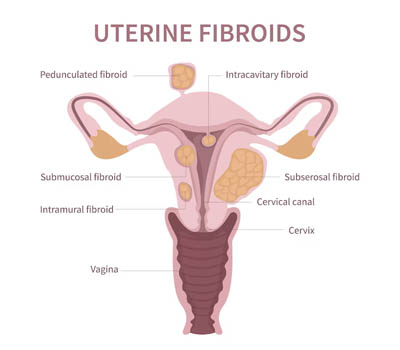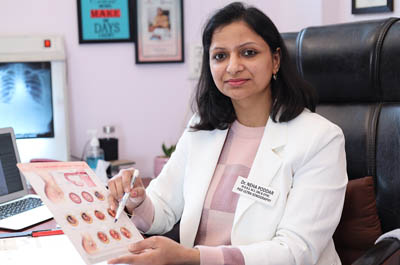
Understanding Uterine Fibroids: Diagnosis, Treatment Options, and Relief at Precision Gynaecology with Dr. Neha Poddar
Uterine fibroids are the most common type of benign (noncancerous) tumors that grow in the muscle wall of the uterus. While they can sometimes cause no symptoms at all, fibroids can also lead to a variety of problems, including heavy bleeding, pelvic pain, and difficulty getting pregnant.
At Precision Gynaecology, Dr. Neha Poddar is a trusted partner in women's health and offers expert diagnosis, treatment options, and relief for women with uterine fibroids.
What are Uterine Fibroids?
-
Uterine fibroids are firm, mass-like growths made of muscle and fibrous tissue.
-
They can vary in size greatly in size, from microscopic to very large masses occupying whole of the abdomen.
-
Fibroids can grow as a single tumor or in multiples.
Causes and Risk Factors:
The exact cause of uterine fibroids is unknown, but certain factors may increase your risk, such as:
-
Hormonal factors: Estrogen seems to stimulate the growth of fibroids. Pregnancy, when estrogen levels are high, can cause fibroids to grow. Fibroids typically shrink after menopause when estrogen levels decline.
-
Family history: Having a close relative with fibroids increases your risk.
-
Race: African American women are more likely to develop fibroids than women of other races.
-
Age: Fibroids are most common during childbearing years (ages 30 to 50).

Symptoms of Uterine Fibroids:
Many women with uterine fibroids have no symptoms. However, some women may experience:
-
Abortions
-
Heavy menstrual bleeding, prolonged periods, or bleeding between periods
-
Pelvic pain or pressure
-
Frequent urination or difficulty emptying the bladder
-
Pain during intercourse
-
Back pain or leg pain
-
Difficulty getting pregnant (in some cases)
Diagnosis:
Dr. Poddar can diagnose uterine fibroids through various methods, including:
-
Pelvic exam
-
Ultrasound scan
-
Magnetic resonance imaging (MRI) scan (in some cases)
Treatment Options:
The best treatment for uterine fibroids depends on various factors, including the size, location, and number of fibroids, as well as your symptoms and desire for future pregnancy. Dr. Poddar offers a personalized approach to treatment, which may include:
-
Monitoring: If you have no symptoms or mild symptoms, Dr. Poddar may recommend monitoring the fibroids with regular checkups.
-
Medication: Certain medications can help manage symptoms like heavy bleeding or pain.
-
Minimally invasive procedures: These procedures, such as uterine artery embolization (UAE) or myomectomy, can be used to shrink or remove fibroids.
-
Surgery: In some cases, a hysterectomy (removal of the uterus) may be recommended, especially if other treatments are not suitable.


Finding Relief and Next Steps:
Uterine fibroids can be a source of discomfort and worry. At Precision Gynaecology, Dr. Poddar understands your concerns and is dedicated to providing relief. She will discuss all your treatment options and help you choose the approach that best suits your individual needs and goals.
Remember, you're not alone. Many women experience uterine fibroids. If you're concerned about symptoms or have been diagnosed with fibroids, schedule an appointment with Dr. Neha Poddar at Precision Gynaecology. Together, you can develop a personalized treatment plan to find relief and improve your quality of life.
FAQS
Uterine fibroids, also known as leiomyomas, are noncancerous growths that develop in the wall of the uterus. These growths can vary in size and number and are composed of muscle and fibrous tissue. While uterine fibroids are common and often benign, they can cause symptoms such as heavy menstrual bleeding, pelvic pain, and pressure on the bladder or rectum. Dr. Neha Poddar at Precision Gynaecology specializes in diagnosing and treating uterine fibroids to alleviate symptoms and improve quality of life.
The exact cause of uterine fibroids is not fully understood, but they are believed to develop due to a combination of genetic, hormonal, and environmental factors. Estrogen and progesterone hormones play a role in stimulating the growth of uterine fibroids, which is why they often develop or enlarge during reproductive years and may shrink after menopause. Certain risk factors such as family history, obesity, and ethnicity may also increase the likelihood of developing uterine fibroids. Dr. Neha Poddar can provide individualized assessments to determine the underlying cause of uterine fibroids and recommend appropriate treatment options at Precision Gynaecology.
Symptoms of uterine fibroids may vary depending on their size, number, and location within the uterus. Common symptoms include heavy menstrual bleeding, prolonged periods, pelvic pain or pressure, frequent urination, constipation, and pain during intercourse. Some women with uterine fibroids may also experience infertility or recurrent miscarriages. If you suspect you may have uterine fibroids or are experiencing symptoms, it's important to consult with Dr. Neha Poddar for evaluation and management at Precision Gynaecology.
Treatment for uterine fibroids depends on various factors such as the size and location of the fibroids, severity of symptoms, and reproductive goals. Dr. Neha Poddar may recommend conservative treatments such as medication to relieve symptoms or hormone therapy to shrink fibroids. Surgical interventions such as myomectomy (removal of fibroids) or hysterectomy (removal of the uterus) may be considered for women with severe symptoms or who have completed childbearing. At Precision Gynaecology, Dr. Poddar provides personalized treatment plans tailored to each patient's needs and goals.
- General Gynae
- Menstrual Disorders
- Vaginal discharge
- Cervical Cancer - Screening & Vaccination
- Pelvic inflammatory disease (PID)
- Infertility treatment (IVF & IUI)
- Uterine polyps
- Septate Uterus (Uterine Septum)
- Uterine Fibroids
- Ovarian Cysts
- Dermoid Cysts
- Ectopic Pregnancy
- Endometriosis
- Menopause
- Hormonal Disorders
- PCOS and Hyperprolactinemia
- Gynae Endoscopy
- Uro Gynae
Are you seeking a qualified and experienced gynecologist and obstetrician in Ghaziabad? Look no further than Dr. Neha Poddar!
- Call 9318413696, 9958170476
- Whatsapp 9318413696

Doctors
-

Dr. Madhu Poddar
-

Dr. R.K. Poddar
-

Dr. Neha Poddar
-

Dr. Rahul Poddar